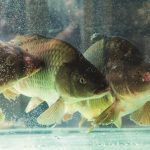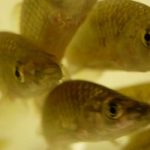Research emerging from the Centre for Conservation Ecology and Environmental Sciences at Bournemouth University (BU) is rated the best in the world for the study of fish biology.
Head of the Centre, ProfessorRudy Gozlan, said: “Fish are carried by a vascular network of rivers and are the blood of millions of people that rely on healthy inland fisheries for food, business and sport fishing. We are delighted that our research contributes to that knowledge and comes in support of human communities all around the world.”
The statistic is from the bibliographic database ‘Scopus’, which calculates institutional strengths, based on article clusters.
Institutions are ranked according to three measures:
- Publication leadership, calculated through the proportion of articles from BU in the fish biology cluster
- Reference leadership, calculated through the proportion of citations in the fish biology cluster that cite BU articles
- State-of-the-art leadership, outlining how recent BU’s fish biology references are.
The accolade comes as BU researchers enter discussions with the Environment Agency regarding the testing of wild fish populations for the deadly parasite Sphaerothecum destruens.
More commonly known as the Rosette Agent, the parasite killed 90% of UK salmon in lab tests and has been blamed for the rapid demise of Leucaspius delineatus, or the sunbleak species, in parts of Europe.
Professor Gozlan said: “Since the first discovery of the Rosette Agent in wild populations five years ago we have carried out a set of tests and all species were highly susceptible to infection. We have carried out further tests in semi-natural conditions and found the same results. We looked at one wild fish population and found the disease present. In California our colleagues did the same in a population of returning salmon and found the parasite in around 40% of the fish. The Environment Agency will not determine the impact of the Rosette Agent unless they start specific health checks.”
More information on the Centre for Conservation Ecology and Environmental Sciences can be found on the centre’s webpages.
 Protecting native fish species
Protecting native fish species BU research models spread of disease through aquatic communities
BU research models spread of disease through aquatic communities










 Missing Persons Indicator Project Recruitment
Missing Persons Indicator Project Recruitment Celebrating our Research: Postgraduate Research Showcase 2026
Celebrating our Research: Postgraduate Research Showcase 2026 Nursing Research REF Impact in Nepal
Nursing Research REF Impact in Nepal Fourth INRC Symposium: From Clinical Applications to Neuro-Inspired Computation
Fourth INRC Symposium: From Clinical Applications to Neuro-Inspired Computation ESRC Festival of Social Science 2025 – Reflecting back and looking ahead to 2026
ESRC Festival of Social Science 2025 – Reflecting back and looking ahead to 2026 3C Event: Research Culture, Community & Cookies – Tuesday 13 January 10-11am
3C Event: Research Culture, Community & Cookies – Tuesday 13 January 10-11am ECR Funding Open Call: Research Culture & Community Grant – Application Deadline Friday 12 December
ECR Funding Open Call: Research Culture & Community Grant – Application Deadline Friday 12 December MSCA Postdoctoral Fellowships 2025 Call
MSCA Postdoctoral Fellowships 2025 Call ERC Advanced Grant 2025 Webinar
ERC Advanced Grant 2025 Webinar Horizon Europe Work Programme 2025 Published
Horizon Europe Work Programme 2025 Published Update on UKRO services
Update on UKRO services European research project exploring use of ‘virtual twins’ to better manage metabolic associated fatty liver disease
European research project exploring use of ‘virtual twins’ to better manage metabolic associated fatty liver disease